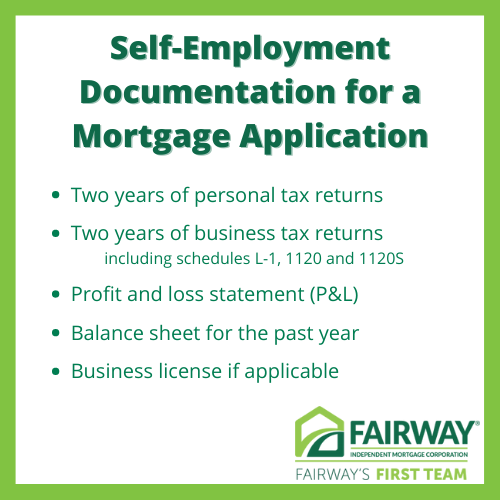How to Qualify for a Mortgage as a Self-Employed Worker or Business Owner
Applying for a mortgage can feel especially daunting if you are self-employed, whether you’re a gig worker or run your own business with employees. While the self-employment mortgage criteria is the same (same income, credit, debt and down payment requirements), proving financial health can be harder for self-employed home buyers than it is for their more conventionally employed counterparts. Below is a list of the documentation you can expect a lender to ask for, as well as a breakdown of how your monthly income is calculated when you’re self-employed. With the right planning, self-employment isn’t a barrier to home ownership. Experts lenders like the team here at Fairway are experienced in helping all types of buyers get into the home of their dreams.
Self-Employment Documentation for a Mortgage Application
The paperwork required for a mortgage application may vary depending on the type of self-employment and the type of loan you’re applying for. Self-employed borrowers will typically need to show two years of personal tax returns, two years of business tax returns including schedules L-1, 1120 and 1120S, a profit and loss statement (P&L) and balance sheet for the past year. You will also need to show proof of business license if applicable. We recommend having these documents prepared by a Certified Public Accountant (CPA), accountant or tax preparer. They should be familiar with exactly what paperwork is required for your specific situation.
Some situations may require less documentation, but it is always better to have gathered more information than less. Borrowers applying for a jumbo loan will likely need a signed CPA letter stating that you are still in business.
Ups and downs are normal in business, but you should be prepared to show that any significant dips in income are part of a normal pattern. This is especially important if you are applying for your mortgage during a down year. You may be asked to show documentation for more than two years in order to prove that your business is healthy.
Along with self-employment documentation, you will be expected to provide the same additional information as those applying for a mortgage with a more traditional job.
Self-Employment Income and DTI
Monthly income is calculated by adding up your annual self-employed income and dividing by the number of months. If you made less this year than the year before, your lender will likely only look at the most recent year and divide the annual income by 12. If your income was higher this year than last, they will likely add up all two years of income and divide by 24.
Along with bank statements, lenders will primarily look at your tax returns. While business write-offs can help you during tax season, they may work against you when it comes to applying for a mortgage. Your accountant can help you prepare your taxes in a way that is in favor of your mortgage application.
Your lender will also calculate your DTI, or debt-to-income ratio. This is done by weighing your monthly income against your monthly debts. Debts are anything you have taken out a line of credit for, including things like student loans and car payments. (Monthly payments that do not involve credit do not factor into DTI.) Even if your income is solid, too much debt could end up disqualifying you for a mortgage. It is a delicate balance, because paying off all of your accounts could end up tanking your credit score. Your lender can advise you on which debts to pay off for an ideal balance.
One of the first steps to finding your dream home is knowing your budget. Getting an understanding of what you can afford will help you find the right house. Let Fairway’s First Team put the financing first & find what’s in your budget. Call (503) 765-1150 today to get started! pic.twitter.com/krXGNMZwEl
— FairwaysFirstTeam (@FairwayImco) March 6, 2022
Self-employment can make applying for a mortgage a bit trickier, but business owners, gig workers and freelancers can make the leap to home ownership. The key to home buying success, especially for self-employed individuals, is working with experts. A CPA, accountant or other tax professional can help your finances come across in the best light. Pro lenders like the loan officers at Fairway’s First Team will match you with the perfect loan for your unique circumstances.



